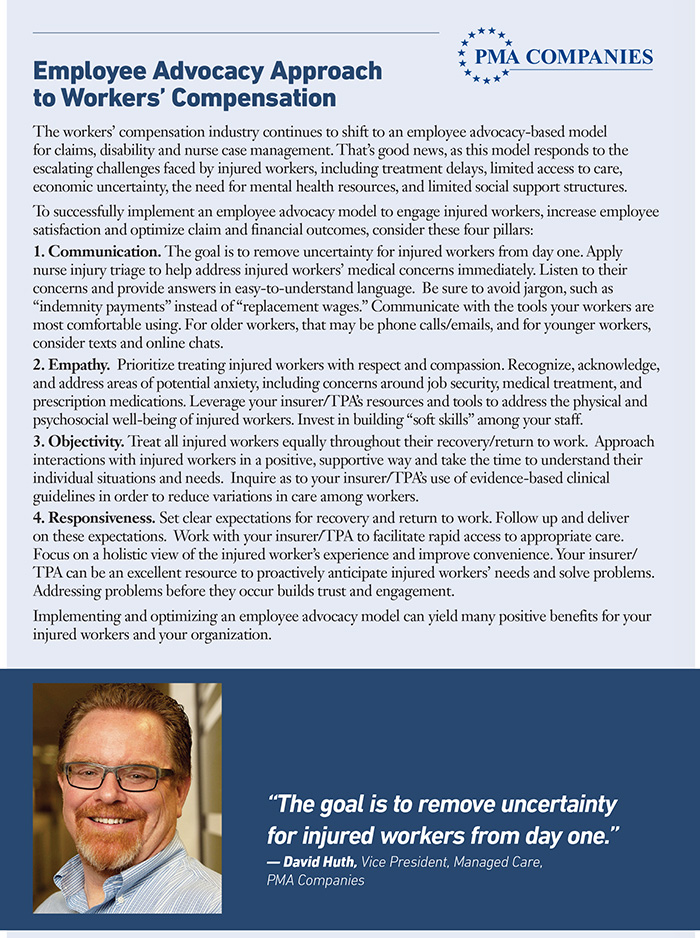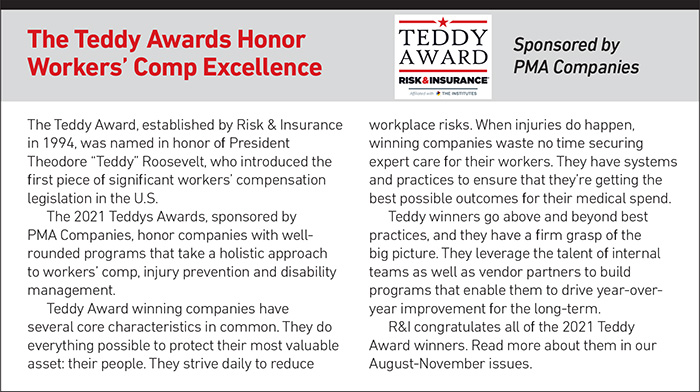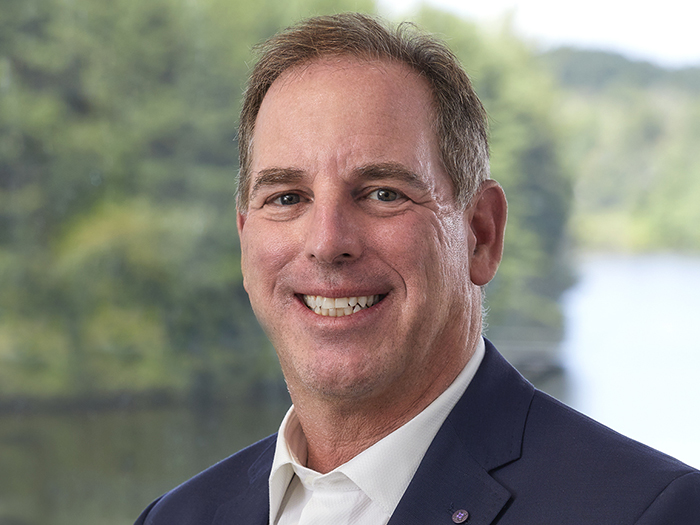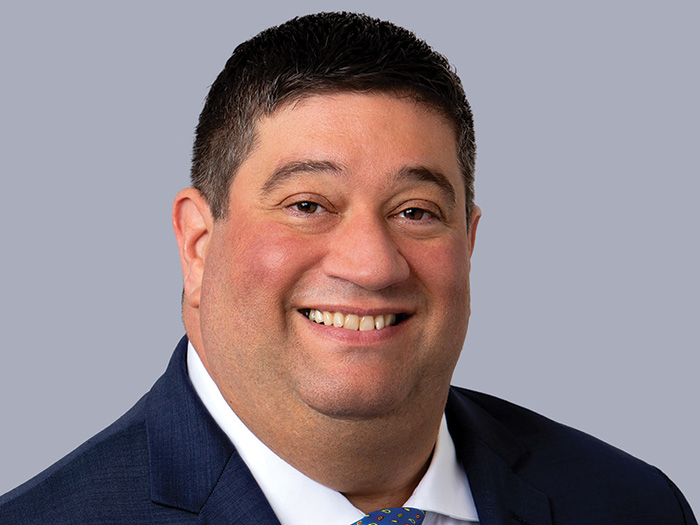How a Focus on Caring for Injured Workers Catapulted General Mills to a 2021 Teddy Award

General Mills puts a lot of energy into preventing incidents and eliminating situations that could cause harm. Still, injuries do occasionally happen. And when they do, it’s not uncommon for Kevin Adams, manager of workers’ compensation at General Mills, to receive a call or email from an injured worker with a question and then personally respond to assist.
In fact, he makes a habit of it. As part of the company’s new approach to injury and illness management, every worker is provided with his personal contact information. That way, he can help ensure the process from injury to recovery is as smooth as possible.
Other companies may look at his efforts and think he’s going above and beyond, but for him it’s just another day at the office.
“The most valuable asset is your employees,” he said. “Let’s get people the care and resources they need. Get them well, and the rest takes care of itself.”
Though strides have been made throughout the industry in recent years with the worker advocacy movement, workers’ compensation is too often seen as adversarial. Workers believe that their employers are looking for reasons to deny claims, rather than help them heal.
Not so at General Mills. Since Adams joined the company in 2017, he’s changed the paradigm and created a standardized workers’ compensation system across North America, and works tirelessly to make sure every member of the General Mills team is an advocate for injured workers.
His hard work has enabled a greater than $600,000 decrease in ultimate loss for the current policy year and has kept average case reserves down, all while promoting a culture of early reporting and intervention, earning the company a 2021 Teddy Award.
General Mills’ Journey to Worker Advocacy

Kevin Adams, manager of workers’ compensation, General Mills
When Adams first came to General Mills, the company’s safety and workers’ compensation programs were more traditional and focused on preventing OSHA recordable injuries and simply reporting claims.
A sole claims manager presided over workers’ compensation, automobile and general liability claims until the company’s global safety group created a position dedicated to workers’ compensation.
“We had a very traditional workers compensation program and were looking for innovation,” said Ed Roethke, senior manager, global safety and environment, General Mills.
Adams filled that position and began remaking the company’s program. At the same time, General Mills was in the process of changing their safety strategy and metrics from OSHA’s recordability criteria to their own internal company criteria, which focus efforts on preventing incidents with the greatest risk to harm people and the organization.
One of the first things Adams did was focus on early intervention and involvement with injured employees. Active involvement in claims can help reduce costs and litigation, something the company was keen to invest in.
He also created a national workers’ compensation system for all General Mills’ North American plants. Prior to that, each plant had its own workers’ compensation policies and procedures.
“Kevin has created the framework which has allowed us to evolve and be successful,” Roethke said.
Strong Programs Support Safety and Recovery
Beyond implementing a national workers’ compensation system, Adams also implemented programs that helped workers from the moment of injury until their recovery.
Many times, when an employee is injured, they may ask their supervisor whether they need to see a doctor or if they should keep working. But supervisors aren’t medical providers, and they don’t have the knowledge to make these decisions.
“Supervisors don’t need to be making medical decisions, it just adds more conflict and risk to the process,” Adams said.
Adams solved this problem by partnering with a nurse triage line where employees can call for guidance about what to do with regards to their injuries.
“Employees now call a designated number to speak with a registered nurse, a registered professional. The nurse provides them guidance as to what level of care that is needed,” he said.
Nurses can advise employees on whether they need to see a doctor, go to the emergency room, or treat the injury with basic first aid. If they need to see a medical provider, General Mills keeps a list of preferred clinics and helps the worker get in touch with doctors there.

The nurse triage program has helped the company reduce the lag time between when an injury occurs and when it is reported. In 2021, 73% of worker injuries were reported within three days, offering employees a seamless transition into the world of workers’ compensation. Many medical only claims are now treated with self-care because of the program.
“We are a values-based company and always looking to do the right thing,” Roethke said. “We lead with safety and when teammates are injured, we put their care and workers’ compensation claim experience first.”
Adams also spearheaded efforts to help plant managers understand the importance of getting workers back on the job, even if they must take on a modified or transitional role. The company’s proactive approach to return-to-work has resulted in lost time day plummeting from an average of 107 for 2013-2014 to 70 for 2020-2021.
“His ideas and approach on return to work are very creative,” Roethke said.
Ensuring Buy-in From the Top Down
With all these changes, Adams needed to make sure that everyone from senior leadership to plant managers and supervisors to the company’s TPA
were invested in the transition.
“All of your stakeholders have to be invested,” he said.
To achieve that, Adams personally visited many of General Mill’s plants to promote the changes to the program. His visits help plant managers understand why changes were being made and
what they could do to help implement a better workers’ compensation system.
He also worked with the General Mills’ TPA, Helmsman Management Services, to create a dedicated claims team that allowed the company to partner with adjusters who really understood their plants and their culture.
“You have to make sure that your partners are an extension of the organization,” Adams said. “I was able to get adjusters that not only fit the personality of the locations, but also fit with the philosophies that were aligned with the philosophies of General Mills, and where our program is going.”
General Mills held a two-day partnership meeting at their headquarters to help cement the relationships between adjusters, plant supervisors and company leadership. Additionally, they conducted a series of plant meetings where their claims team spent time with individual plants to foster connections with leadership.
All this relationship building has helped ensure that everyone is working toward the same goal: helping injured workers.
“The things that Kevin has done to advance the program allow our leaders to lead with more consistency, compassion, and care,” Roethke said. “His passion for innovation and caring approach are
a winning combination.” &











